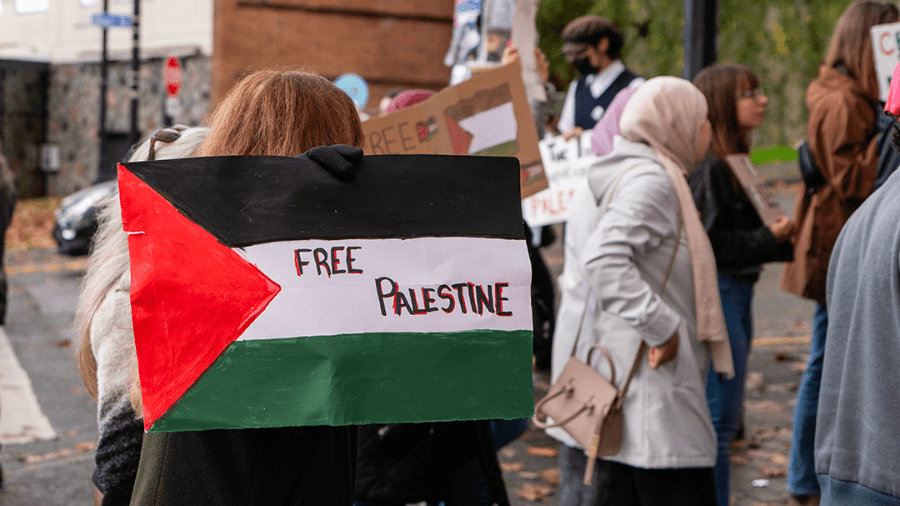This article originally appeared in the National Post.
By Rahim Mohamed, November 15, 2023
Over the weekend, Richard Ward, a high school principal in Brampton, Ont., raised more than a few eyebrows when he quote tweeted a story about the sharp rise in antisemitic incidents in Canada and wrote: “Your headline rewritten for accuracy: Anti-Zionism has skyrocketed in the wake of the Israel-led genocide in Palestine.” The tweet was later deleted, but not before it was captured by a screenshot.
Unfortunately, the “anti-Zionist” sentiment, push-back against the idea of a Jewish homeland in Israel, he expressed isn’t exactly uncommon. In fact, the refrain, “I’m not antisemitic, just anti-Zionist” has become something akin to the qualifier, “I’m not racist but …” The irony, of course, is that the global response to the horrific events of Oct. 7 shows exactly why Israel exists in the first place — and why its survival is an existential matter for the global Jewish community.
Oct. 7 saw the highest number of Jews slaughtered in a single day since the Holocaust. The days and weeks that followed gave the world an opportunity to reflect on the inhumanity of the violence in southern Israel (much of which was live-streamed by Hamas terrorists) and stand in solidarity against the global scourge of antisemitism. Instead, the massacre has, perplexingly, set off a wave of antisemitism the world over, with Canada being no exception.
Not even the 85th anniversary Kristallnacht last week could turn back the tide of hate. In fact, the sombre anniversary was marred by scenes eerily reminiscent of the event itself in a number of major cities. Here in Canada, the city of Montreal, home to a quarter of the country’s Jewish population, has been an epicentre of anti-Jewish hatred.
Chaos broke out at Concordia University on Nov. 8, when a group of pro-Palestinian students mobbed a table set up to raise awareness of the Israeli civilians who were kidnapped on Oct. 7. Cellphone footage from the scene captured a University of Montreal instructor telling an Israel supporter to “go back to Poland.” (Suggesting either that Jews belong in Europe rather than Israel, or referencing Nazi Germany’s six major extermination camps located in occupied Poland.)
Tensions have only increased since then. Two Montreal-area Jewish schools were shot at overnight on Nov. 8 and a third shooting incident was reported on Sunday. The events of the past few days have left Montreal’s 90,000 Jews living in a climate of fear.
If Jews can’t even feel safe in a city that was once home to Leonard Cohen and Mordecai Richler, and whose most famous gastronomical landmarks include Jewish bagel shops and delicatessens, where exactly can they feel safe?
The ugly truth is that, for the vast majority of the 8.3-million Jews who live outside of Israel, safety will always be fleeting. While virtually every identifiable group faces some level of discrimination, antisemitism is a uniquely global and insidious form of hatred. Hitler’s book “Mein Kampf,” which was first published in 1925, continues to this day to enjoy strong sales, hitting best-seller lists this century in places like Turkey and India.
Last year, Israel received more condemnations from the United Nations General Assembly than all other members states combined. (Russia, which launched a full-on invasion of a fellow UN member state in February, received just 6 rebukes, compared to Israel’s 15).
Antisemitism may go underground for years at a time but when the mask slips (and it will slip), Jews will invariably be left at the mercy of their home countries, having neither the numbers nor the influence to protect themselves through political channels. Only one country outside of Israel, the United States, is home to a million or more Jews, and even there, Jews comprise just over two per cent of eligible voters.
Even in Canada, politicians have failed to forcefully condemn antisemitism here at home, out of fear of alienating Muslim voters in the Greater Toronto Area’s 905 belt and other electorally competitive regions. To wit, Liberal government officials, including the prime minister, have made a habit of shoehorning the word “Islamophobia” into statements condemning acts of antisemitism.
While morally abhorrent, this hedging is likely good politics. Canada’s 400,000 or so Jews, who are geographically concentrated in non-competitive urban ridings within Toronto and Montreal, are an expendable bunch, electorally speaking.
The events of the past month (including events here in Canada) have only reinforced the reality that the world’s 15-million Jews will never have security without recourse to the resources (military and otherwise) afforded to a modern nation-state. For the good of humanity, that state must be Israel.
Rahim Mohamed is a senior editor at the Macdonald-Laurier Institute.






